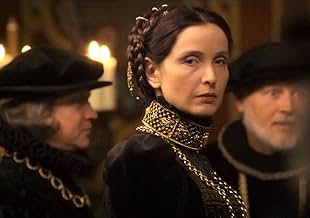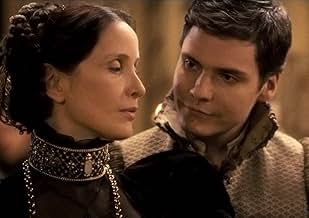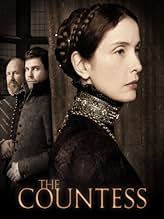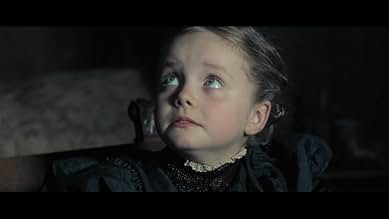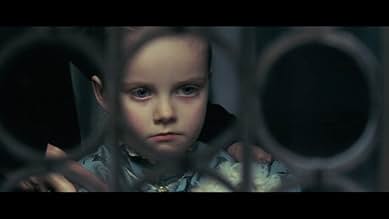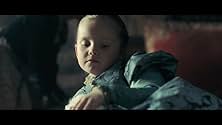VALUTAZIONE IMDb
6,2/10
8869
LA TUA VALUTAZIONE
Una contessa ungherese del XVII secolo si imbarca in un'impresa omicida, con la convinzione che bagnarsi nel sangue delle vergini conserverà la sua bellezza.Una contessa ungherese del XVII secolo si imbarca in un'impresa omicida, con la convinzione che bagnarsi nel sangue delle vergini conserverà la sua bellezza.Una contessa ungherese del XVII secolo si imbarca in un'impresa omicida, con la convinzione che bagnarsi nel sangue delle vergini conserverà la sua bellezza.
- Regia
- Sceneggiatura
- Star
- Premi
- 1 vittoria e 1 candidatura in totale
Andy Gätjen
- Miklos
- (as Andy Gatjen)
Recensioni in evidenza
Well, actually, in the Little Carpathians, apparently, which are not part of Transylvania, or so Wikipedia tells me.
I really enjoyed this film (at home on pay-per-view)though I think it is intended for a pretty narrow audience. As others have noted, the dialogue is amazingly stilted (very literary, rather like a French novel of the 17th or 18th century) and delivered in near-monotone. I kept feeling that the whole movie had been dubbed into English. On the other hand, I found the acting very fine, and I admired the insistence on presenting these characters as not at all like you, me, or the folks in the latest TV drama. The Countess in particular is a strange, unique portrait--her piety, her desire for amorous adventure, her pride, her intelligence. And that's before you get to the blood-of-virgins part.
The film proposes that what we are seeing before our eyes is not the truth about the Countess. We are watching a fantasy of a noblewoman enacting a tale "told by the victors"--by the men who were enriched by her downfall and relieved, too, to be rid of the very possibility of an intelligent woman. The tale is told, too, by the peasants and others whose sons are fighting in her army. Yet the man who questions the gory story is her lover, and he too may be deceived. There is no simple answer to the question, what really happened?--no resolution.
In short, it's an intellectual (and visual) treat, but it won't affect your blood sugar.
I really enjoyed this film (at home on pay-per-view)though I think it is intended for a pretty narrow audience. As others have noted, the dialogue is amazingly stilted (very literary, rather like a French novel of the 17th or 18th century) and delivered in near-monotone. I kept feeling that the whole movie had been dubbed into English. On the other hand, I found the acting very fine, and I admired the insistence on presenting these characters as not at all like you, me, or the folks in the latest TV drama. The Countess in particular is a strange, unique portrait--her piety, her desire for amorous adventure, her pride, her intelligence. And that's before you get to the blood-of-virgins part.
The film proposes that what we are seeing before our eyes is not the truth about the Countess. We are watching a fantasy of a noblewoman enacting a tale "told by the victors"--by the men who were enriched by her downfall and relieved, too, to be rid of the very possibility of an intelligent woman. The tale is told, too, by the peasants and others whose sons are fighting in her army. Yet the man who questions the gory story is her lover, and he too may be deceived. There is no simple answer to the question, what really happened?--no resolution.
In short, it's an intellectual (and visual) treat, but it won't affect your blood sugar.
Very interesting plot. I love historical movies. I was really excited when I found out, that there is a movie about a Hungarian countess. As I am Hungarian i was really looking forward to watching it.Bit disappointing. At least if you make a movie try and be true to the country you are showing. Pronunciation of the names if terrible. The characters were not even similar to Hungarians. So basically if I didn't know she was Hungarian, I wouldn't even have recognised the place or country it related to. Apart from that, the story is unusual, the movie is an art. But if you watch it, do not think this is the real 17th century in Hungary:).
This movie rocks because it manages to be both a lavish, complex period movie and a psychological horror movie at the same time. Julie Delpy does a fantastic job in the role of a complex woman from a brutal period in European history, and her performance somehow gracefully manages to be both sympathetic and monstrous. Bathory is one of history's most prolific and sadistic mass murderers, but historians are ultimately unsure of who she really was, and to what extent she was responsible for the atrocities for which she is credited. Most agree that the whole "beauty treatment bloodbath" thing is a myth made up by later generations to spice up the story, so I was surprised that a telling supposedly rooted in fact ended up going that route, but I loved the idea of a Bathory who is a real person and not just a 2-dimensional fiend. Great sets, costumes, and performances from a well-written script make The Countess an engaging and informative portrait of a woman whose vanity and blood lust have become the stuff of legend.
Julie Delpy gives her own vision (through an innocent young man's eyes who would have been one of her numerous -male and female-lovers)of a nefarious figure of history .her direction is icily impersonal but effective .Her hieratic cold look gives the jitters for her acting is restrained.Unlike Walerian Borowczyk's segment of "Les Heroines Du Mal"(1979) in which Paloma Picasso played an "erotic " countess with nudity galore,"the countess" has few bed scenes and few gore clichés -and with THAT subject,it is much to Delpy's credit.Her directing is not feminine at all (as Agnès Varda's or Jane Campion's are) and her character has the mind of a man :political power,women and men treated -with one exception- as sexual objects .She wouldn't sacrifice a virgin lad cause ,she says , God created man in his own image .She remained pious even in living in the most awful sin!
The atmosphere which is depicted does not square with reality,if you read one of her biographies:she lived in a lugubrious castle ,in a cold area,and she suffered from chronic migraines which almost never gave her any respite.
The atmosphere which is depicted does not square with reality,if you read one of her biographies:she lived in a lugubrious castle ,in a cold area,and she suffered from chronic migraines which almost never gave her any respite.
Writer/director/producer/musical scorer/actress Julie Delpy brings to the screen a character from history that few know. The film is based on the true history of the woman known as The Blood Countess, but after viewing this film it is obvious that the actual figure on whom the story is based was a brilliant political mind, a woman of noble breeding who could read and write in four languages, who once widowed was able to successfully defend her lands from the warring Turks and exact control over the reigning Hungarian King Matthias. But back to the history of the character as written by Delpy. 'Countess Elizabeth Báthory de Ecsed (Báthory Erzsébet in Hungarian) (1560 - 1614) was a countess from the renowned Báthory family of Hungarian nobility. She is considered the most prolific female serial killer in history and possibly the most prolific of any gender. She and four collaborators were accused of torturing and killing hundreds of girls, with one witness attributing to them over 650 victims, though the number for which they were convicted was 80. Erzsébet herself was neither tried nor convicted. In 1610, however, she was imprisoned in the Csejte Castle, where she remained bricked in a set of rooms until her death four years later. Later writings about the case have led to legendary accounts of the Countess bathing in the blood of virgins in order to retain her youth.'
The film opens with voice over by István Thurzó (Daniel Brühl) who relates the story of his only love. We are privy to the strange behaviors of the young Erzsébet who had a sadistic streak and was at birth promised to be the bride of Ferenc Nádasdy (Charly Hübner). She became a beautiful woman and Erzsébet (Julie Delpy) married General Nádasdy, gave birth to children, and together they were the power couple of Hungary. When Nádasdy dies, Erzsébet meets and falls passionately in love with István Thurzó (Daniel Brühl), a many 19 years her junior, but Istvan's father György Thurzó (William Hurt) prevents Istvan from remaining with Erzsébet. Left alone Erzsébet remains a powerful warrior, dallies with the sadomasochistic Dominic Vizakna (Sebastian Blomberg), but fears her young lover will forget her if she ages. She discovers that the blood from virgins will restore her youth and thus begins the serial killings to support her vanity. As questions of debts owed to her by the King there is an investigation of her personal history led by György Thurzó and without proper trial she is condemned to house arrest in darkened sealed rooms in her own Csejte Castle where her fate is sealed.
The film is beautifully designed, costumed, photographed and scored, and Delpy manages to pace her story credibly and well. For this viewer there is an absence of gritty passion that would make the history more indelible: Delpy and the remainder of the cast fail to create fiery on-screen chemistry that would have brought a sense of stronger impetus to the heinous acts that occur. But as a piece of rarely known history it is a fascinating film about a strong woman of the past and the impact she had on her country ... and on legends!
Grady Harp
The film opens with voice over by István Thurzó (Daniel Brühl) who relates the story of his only love. We are privy to the strange behaviors of the young Erzsébet who had a sadistic streak and was at birth promised to be the bride of Ferenc Nádasdy (Charly Hübner). She became a beautiful woman and Erzsébet (Julie Delpy) married General Nádasdy, gave birth to children, and together they were the power couple of Hungary. When Nádasdy dies, Erzsébet meets and falls passionately in love with István Thurzó (Daniel Brühl), a many 19 years her junior, but Istvan's father György Thurzó (William Hurt) prevents Istvan from remaining with Erzsébet. Left alone Erzsébet remains a powerful warrior, dallies with the sadomasochistic Dominic Vizakna (Sebastian Blomberg), but fears her young lover will forget her if she ages. She discovers that the blood from virgins will restore her youth and thus begins the serial killings to support her vanity. As questions of debts owed to her by the King there is an investigation of her personal history led by György Thurzó and without proper trial she is condemned to house arrest in darkened sealed rooms in her own Csejte Castle where her fate is sealed.
The film is beautifully designed, costumed, photographed and scored, and Delpy manages to pace her story credibly and well. For this viewer there is an absence of gritty passion that would make the history more indelible: Delpy and the remainder of the cast fail to create fiery on-screen chemistry that would have brought a sense of stronger impetus to the heinous acts that occur. But as a piece of rarely known history it is a fascinating film about a strong woman of the past and the impact she had on her country ... and on legends!
Grady Harp
Lo sapevi?
- QuizProduction on the film was delayed numerous times. It was initially expected to start filming in 2005, then in summer 2007, followed by October 2007, before finally starting in February 2008. This led to three initially cast actors having to drop out, first Ethan Hawke as Gyorgy Thurzo and later Radha Mitchell as Anna Darvulia and Vincent Gallo as Dominic Vizakna.
- BlooperAt about 1h15m, the fifth book on the shelf is the "Dictionnaire De Boyer". Abel Boyer did write a French-English dictionary, but he was born in 1664 and Countess Báthory died in 1614.
- Citazioni
Gyorgy Thurzo: Love is a myth, to keep the minds of young peasants and virgins occupied with a dream.
- ConnessioniVersion of I vampiri (1957)
- Colonne sonoreCouranta VI
Solinger Streichquartett
Written by Isaak Pesch
From the album "Telemusik"
© & ® Peter Lamprecht
Courtesy of Solinger Streichquartett/Peter Lamprecht
I più visti
Accedi per valutare e creare un elenco di titoli salvati per ottenere consigli personalizzati
- How long is The Countess?Powered by Alexa
Dettagli
- Data di uscita
- Paesi di origine
- Siti ufficiali
- Lingue
- Celebre anche come
- The Countess
- Luoghi delle riprese
- Burg Kriebstein, Kriebstein, Saxony, Germania(exteriors: Countess Bathory's castle)
- Aziende produttrici
- Vedi altri crediti dell’azienda su IMDbPro
Botteghino
- Budget
- 5.700.000 € (previsto)
- Lordo in tutto il mondo
- 784.522 USD
- Tempo di esecuzione
- 1h 38min(98 min)
- Colore
- Mix di suoni
- Proporzioni
- 2.35 : 1
Contribuisci a questa pagina
Suggerisci una modifica o aggiungi i contenuti mancanti

